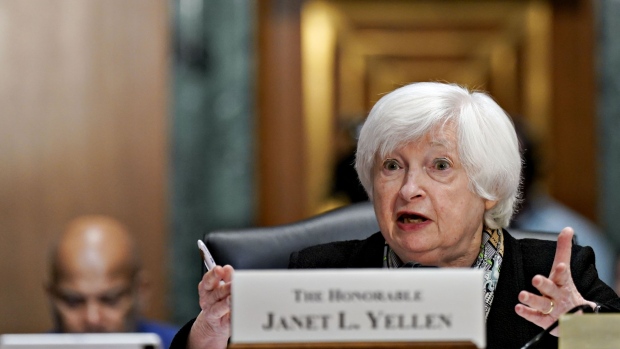Mar 21, 2023
Yellen Says US Will Intervene if Needed to Protect Smaller Banks
, Bloomberg News

(Bloomberg) -- Treasury Secretary Janet Yellen said on Tuesday the US government could repeat the drastic actions it took recently to protect bank depositors if smaller lenders are threatened.
“Our intervention was necessary to protect the broader US banking system, and similar actions could be warranted if smaller institutions suffer deposit runs that pose the risk of contagion,” Yellen said in remarks to an American Bankers Association conference in Washington.
The federal government “is resolutely committed” to mitigating financial-stability risks where necessary, Yellen said in a question-and-answer session. “The public should have confidence in our banking system.”
US authorities took extraordinary steps earlier this month to bolster that confidence following the collapses of Silicon Valley Bank and Signature Bank. Regulators guaranteed insured and uninsured deposits at the two institutions. The Federal Reserve also launched a new backstop for lenders and altered rules at its emergency lending facility — the so-called discount window — to help them meet deposit withdrawals.
Yellen said that the current troubles are notably different than the global financial crisis more than a decade ago, which was an issue with solvency. Today’s challenge is “contagious bank runs,” and it’s vital that lenders have access to adequate liquidity, she said.
The Fed — which Yellen previously chaired — is the key institution, she indicated. The central bank’s discount window and its new Bank Term Funding Program are “working as intended,” she said.
“We see the situation as having improved,” with aggregate outflows from deposits having stabilized, Yellen said. Officials will continue to monitor the situation, she also said.
A coalition of mid-sized banks has pressed for an expansion of federal deposit insurance to cover all deposits, but Yellen didn’t address the issue Tuesday. US officials have begun studying whether they can temporarily expand that coverage, Bloomberg reported.
Yellen also wouldn’t “speculate” on what kind of regulatory changes might be needed in the wake of this month’s bank collapses.
“We are currently focused on the situation at hand,” she said in her prepared remarks. “But we will need to reexamine our current regulatory and supervisory regimes and consider whether they are appropriate for the risks that banks face today.”
Yellen’s comments come on the heels of two weeks of tumult in global markets and heightened worries over financial stability after the rapid-fire collapse of the US banks and a historic deal over the weekend that saw UBS Group AG agree to buy its troubled Swiss rival Credit Suisse Group AG.
In the US, First Republic Bank continues its battle to restore confidence after a plunge. in its share price. JPMorgan Chase & Co. Chief Executive Officer Jamie Dimon has led plans to have a group of big banks convert some or all of the $30 billion they deposited last week with First Republic into a capital infusion, according to people familiar with the matter.
On Tuesday, Yellen defended the recent government measures as a swift and necessary response.
“The federal government delivered just that: decisive and forceful actions to strengthen public confidence in the U.S. banking system and protect the American economy,” she said.
The steps, she said, “reduced the risk of further bank failures that would have imposed losses on the Deposit Insurance Fund.”
She added that the US financial system was much stronger than in 2008 due in part to post-crisis reforms that enforced higher capital requirements for US lenders.
Yellen also said the government hoped to preserve the role of small and mid-sized lenders within the larger financial system.
“Large banks play an important role in our economy, but so do small- and mid-sized banks,” she said. “Treasury is committed to ensuring the ongoing health and competitiveness of our vibrant community and regional banking institutions.”
Separately, Yellen reiterated her call for Congress to increase or suspend the federal debt limit, calling that “utterly essential.” While President Joe Biden stands ready to engage with lawmakers on addressing fiscal sustainability, that ought to be done through the regular appropriations process, not under the threat of a “catastrophic” default, she said.
(Updates with comments from question-and-answer session starting in third paragraph.)
©2023 Bloomberg L.P.


